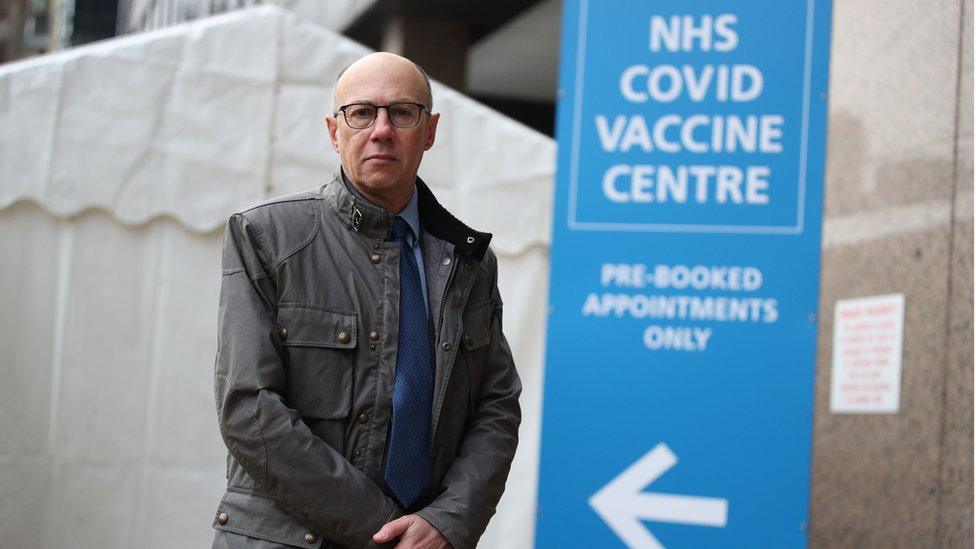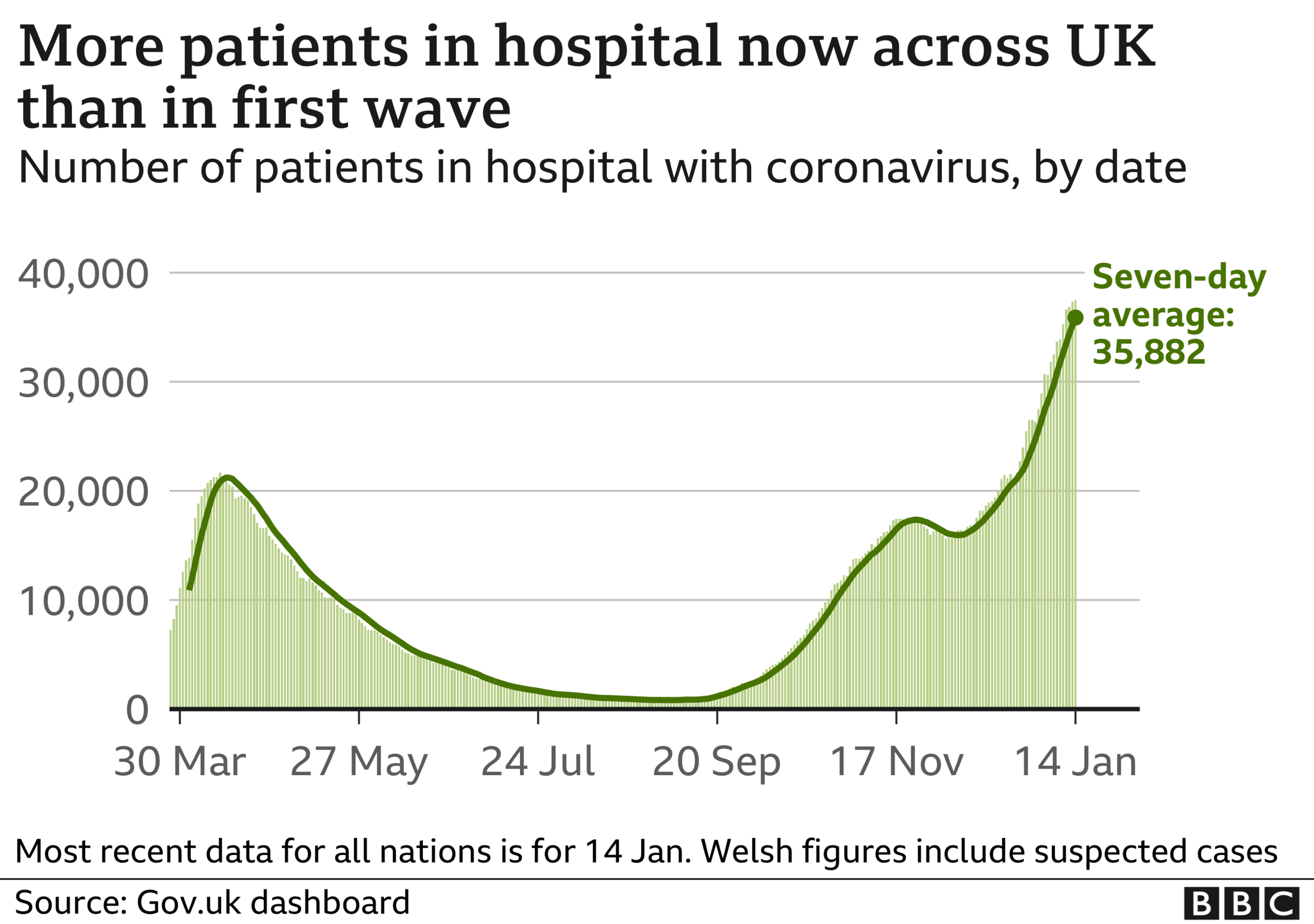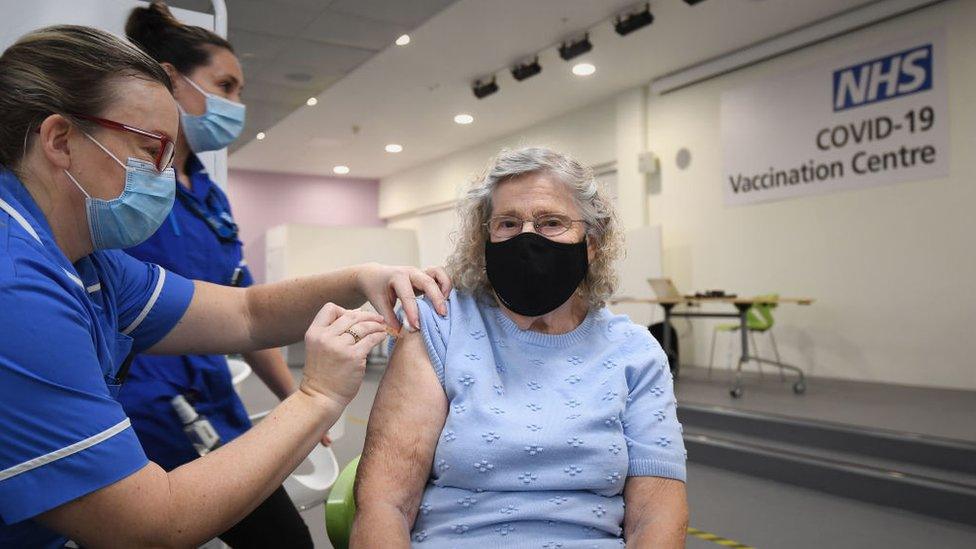Covid-19: Vaccine rollout extended to over-70s in England
- Published
The prime minister warns that "we're not out of the woods yet"
People in England in their 70s, and those listed as clinically extremely vulnerable, external, will begin receiving offers of a coronavirus vaccine this week.
Prime Minister Boris Johnson said the move was a "significant milestone" in the nation's vaccination programme.
More than five million people - from priority groups three and four - will be invited from Monday to have the jab.
It comes as 10 further mass vaccination hubs open across England.
Speaking from a vaccination centre in Oxford, Mr Johnson said about four million people had received a vaccine so far, adding it was now "right" to offer the jab to other priority groups.
He said: "We're getting it out as fast as we can, four million done so far, I think we've done more than half of the over-80s, half of the people in care homes, the elderly residents of care homes."
He warned there would be no "Open Sesame" relaxation of Covid restrictions, adding that any easing was reliant on the vaccine rollout being a success and there being no further concerning variants of the virus.
He said the pace of the rollout was "very encouraging" but cautioned that any easing of the rules would be "gradual", as the situation was "still pretty precarious".
Health Secretary Matt Hancock will lead a Downing Street news briefing later, No 10 has said.
The expansion of the vaccination programme comes after the number of people to receive a first dose rose to 3.8 million across the UK - more than have tested positive (3.4 million) since the pandemic began.
However, people in the top two groups - care home residents, those aged 80 and over, and front-line healthcare workers - should still be prioritised for vaccinations, the Department for Health and Social Care said.
People in their 70s - some 5.6 million people - and clinically extremely vulnerable individuals make up priority groups three and four.
Nadhim Zahawi, the minister responsible for the vaccine rollout, defended the decision to offer Covid jabs to the over-70s and clinically vulnerable - before all those in the first two priority groups have had their vaccinations.
He told BBC Radio 4's Today programme that the over-80s "need not worry" if they had not yet been invited for a jab.
He said as it was only areas where the majority of the over-80s had been vaccinated that people aged 70 and over were being invited for jabs. He added that, by today, 50% of care home residents should have been vaccinated.
Although vaccine supply remained "lumpy", he said he was "confident" the government would meet its target to vaccinate all 15 million people in the top four priority groups by 15 February.

Visiting the NHS Covid Vaccine Centre in Wembley, north London, Prof Stephen Powis said there were signs in the capital that growth and infection rates were slowing
Meanwhile, Prof Stephen Powis, national medical director for NHS England, said the NHS had never been under the level of pressure it is now, in any previous winter.
Prof Powis told BBC Breakfast: "I don't think the NHS has ever been under such pressure in any winter, but our staff are responding magnificently."
He added that there were "signs" in London that growth and infection rates were "slowing" but it would take "several weeks" before it had an impact in reducing the number of people in hospital, warning that it would be "tough" over the next couple of weeks.

LOCKDOWN LOOK-UP: The rules in your area
QUARANTINE: What are the new UK travel rules?
TREATMENT: How close are we to helping people?
LOOK-UP TOOL: How many cases in your area?

Dr Rupert Pearse, a consultant in Intensive Care Medicine at a London Hospital, said although it appeared that infection levels had peaked in the capital, cases were still rising elsewhere in England, including the North West and Yorkshire, adding there was "still cause to be concerned".
He told BBC Radio 4's World At One that hospital admissions tended to "lag seven to 10 days behind the peak in infections", with intensive care admissions coming 48 hours after that.
He said that hospitals that are very close to the maximum number of beds they can give to Covid patients were "still very worried about what will happen in the coming days".
BBC's Laura Foster explains the order in which the Covid vaccine will be given
Dr Sarah Burford, a GP in Wellington, Somerset, who has been helping lead vaccine rollout in her region, said it was going "terribly well" but that "a few" patients had turned up out of the blue looking for a jab.
She told BBC Radio 4's World At One programme that her four vaccinators were each giving a jab every seven-and-a-half minutes.
Dr Burford added the over-80s and frontline healthcare workers were being invited for jabs, and her team's "priority" for this week and next would be vaccinating care home residents and staff.
She said although most people were being patient, fielding calls or walk-in inquiries about when people could expect to be vaccinated was only delaying staff from administering jabs.

The new mass vaccination centres are in:
Bournemouth International Centre, Dorset
Taunton Racecourse, Somerset
Blackburn Cathedral, Lancashire
Salt Hill Activity Centre, Berkshire
Norwich Food Court, Norfolk
The Lodge in Wickford, Essex
Princess Royal Sports Arena, Boston, Lincolnshire
St Helens Rugby Ground, Merseyside
The park-and-ride at Askham Bar, York
Olympic Office Centre in Wembley, north London
The seven hubs already in use are in: Etihad Tennis Centre, Manchester; Epsom Downs Racecourse, Surrey; Robertson House, Stevenage; Centre for Life, Newcastle; Ashton Gate Stadium, Bristol; Millennium Point, Birmingham; ExCel, London.

Meanwhile, Welsh First Minister Mark Drakeford has defended the speed of the vaccine rollout in Wales, insisting the nation was "on track" to vaccinate all top four priority groups by mid-February.
He told BBC Radio 4's Today programme that Wales's supply of the Pfizer jab is not being used all at once as it has to last until a delivery in February.
In Wales, 151,737 people have received a first dose of a Covid vaccine, according to Public Health Wales, and in Scotland, First Minister Nicola Sturgeon announced that 264,991 people have had a first dose of the jab, with 80% of care home residents having now been vaccinated.
The boss of NHS England reveals Covid-19 jabs are being done much faster than people are newly catching the virus
While the prime minster said the UK is making "huge progress in our fight against the virus", he also expressed concern about that progress being derailed by new - currently unknown - variants of the virus.
As such, he announced on Friday that, from this week, all travel corridors are to be closed.
That means that anyone arriving in the UK - with only a small number of exceptions, external - will have to quarantine. Under current rules, anyone flying into the country from overseas also has to show proof of a negative Covid test before setting off.





Are you due to have a coronavirus vaccine? You can get in touch by emailing haveyoursay@bbc.co.uk, external.
Please include a contact number if you are willing to speak to a BBC journalist. You can also get in touch in the following ways:
WhatsApp: +44 7756 165803
Tweet: @BBC_HaveYourSay, external
Please read our terms & conditions and privacy policy
If you are reading this page and can't see the form you will need to visit the mobile version of the BBC website to submit your question or comment or you can email us at HaveYourSay@bbc.co.uk, external. Please include your name, age and location with any submission.
Related topics
- Published17 January 2021
